Marcus is big on emphasizing that “People are the most important thing.” But when you bring that understanding into the workplace, who comes to mind? You probably think about your co-workers, your employees, your business partners, and your customers. But who’s not on that list yet? Who’s usually missing from these conversations? You are. That’s right. Most people don’t pay nearly enough attention to how they’re treating themselves. Self-respect is a huge part of tending your own garden and strengthening your foundation in the world. This is an article focused on how to respect yourself at work, so you can be happier, healthier, and reach your full potential.
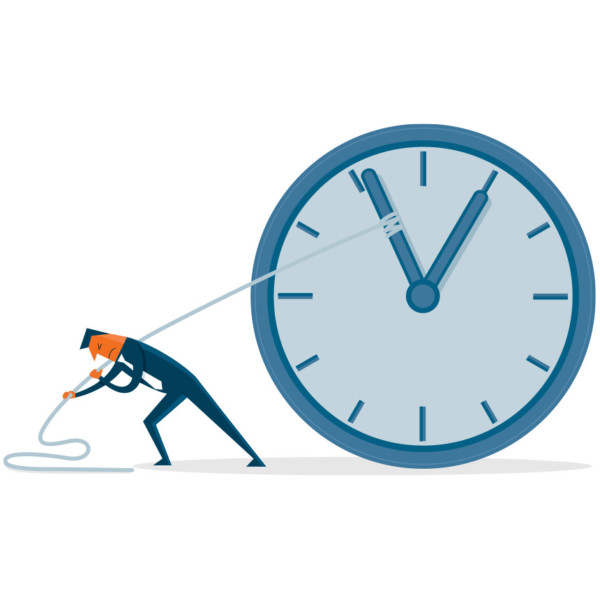
The Importance of Self-Respect in the Workplace
When you come up through the workforce, you’re told to listen to your boss and get along with your colleagues. You could even say that’s “Workplace 101.” But when you get a little more experience, you realize it’s not so cut-and-dried. What if someone says something that’s a little out-of-bounds? What if they ask you to do something that they don’t realize is illegal? What if they’ve asked you to work a 90-hour week for the fourth month in a row?
People have great intentions, but every now and then, they cross a line. When you respect yourself, you help nip a lot of that in the bud, because you create an expectation for how people are allowed to treat you. Whether it’s with your colleague, a customer, or a financier, self-respect is all about setting a boundary and enforcing it.
Think about self-respect as your Bill of Rights within the workplace. You have the right not to be bullied, marginalized, or headlocked into delivering on impossible expectations.

You also have the right to advocate for yourself, be heard, and set boundaries. Here’s one very important thing to remember, though. This doesn’t just apply to how you interact with others. It also applies to how you interact with yourself. Are you ever distracted by negative self-talk? Has an overpowering sense of doubt ever kept you from asking for an opportunity? Have you ever allowed your mistakes to define you? Great news. You don’t have to live like that. Jack Nicklaus always used to say, “The game of golf is 90% mental.” You could say the same thing about the game of life. When you respect yourself, you remove all of the interpersonal noise and mental chatter that clutters the path to success.
The Benefits of Self-Respect
Self-respect is a human right. But further, when you respect yourself, you also enjoy a few really specific benefits. First, The Mayo Clinic, which is consistently ranked as one of the best hospitals in the U.S., explains that it makes you less susceptible to fear and anxiety. Second, they say you’re more likely to form healthy relationships and avoid unhealthy ones. And third, you’ll be more confident in your ability to make decisions and more assertive in expressing your needs. Those are all huge “must-haves” in your professional tool belt. You’ll not only feel more comfortable asking for opportunities, but people will feel more comfortable giving you those opportunities.

You’ll also be better equipped to knock them out of the park once they arrive.
But maybe the most important part about this article is that if you’ve struggled with how to respect yourself in the past – that’s okay. Marcus always tells businesses, “If you don’t evolve, you die.” The same goes for people. While you obviously won’t die, your career and overall happiness could flatline if you don’t prioritize self-respect and give it the occasional tune-up. But don’t worry. You’ve got this. The article you’re reading explains exactly how to tighten that up so you can embark on a happy, winning path.
How to Respect Yourself in the Workplace
Set and Enforce Boundaries
Life comes at you fast, and sometimes, it’s nice to know where your line is before you end up in an “iffy” situation. So, give some thought to what you’re comfortable with, then make sure your work interactions meet the standard. That’s exactly what Marcus did when he worked with an embroidery company in New York. The company had a lot of irons in the fire in an exciting way. But the more Marcus dug deeper, the more he noticed that the company had a bit of a transparency problem. They hadn’t disclosed a ton of money in back taxes. They were using Marcus’ money on their personal expenses. They even stopped paying rent and started ducking their landlord. Marcus engaged the CEO in a polite, but firm way, to explain their dynamic was veering off course. Then, when the CEO wasn’t able to fix the issues, Marcus enforced the boundary by moving on from the partnership. When you respect yourself, that means you’re going through a similar process of drawing a line and standing firm when it’s crossed.
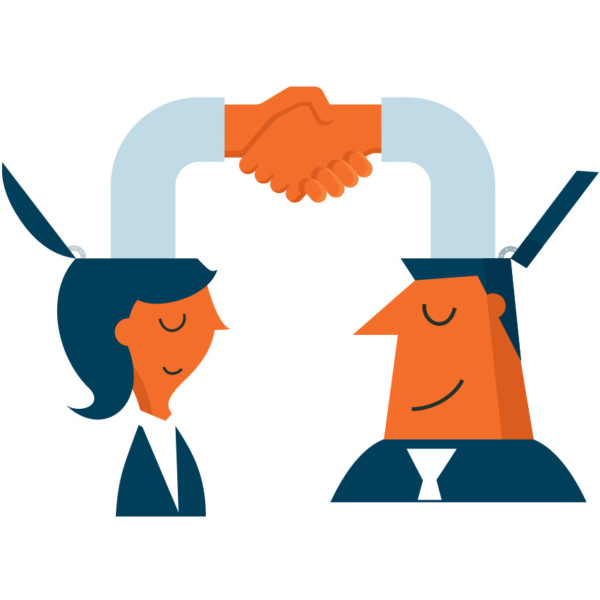
Push Back Politely
There’s a great book about negotiation and conflict resolution called Never Split the Difference. It’s by a former hostage negotiator named Chris Voss and the book contains a ton of gems. But among the best was when he explained, “The people you appear to be in conflict with are not your opponents. They are your partners.” That’s a great way to think of conflict at work. These aren’t your adversaries. They’re just your colleagues. Like any relationship, sometimes you hit a pothole. But it doesn’t have to be some huge, tense moment.
He describes a technique called “mirroring” that’s great for when people cross a line. You literally just repeat what the person said, but as a question. So, if someone says, “You can’t handle this project.” You can reply with a very simple, calm, “I can’t handle this project?” It’s a nice way of challenging them on what they said and making them think twice. If they double down, Voss talks about the power of saying “no” without actually saying the word “no.” You might find a helpful phrase like, “I’m sorry, but what you just said doesn’t really work for me.” It’s really as simple as that and a great way to tell people where the line is. Put that technique in your back pocket, so you can draw a line in the sand, respect yourself, and do it all without blowing up the interaction.
Respect Yourself by Putting Your Weaknesses in Context
Your failures don’t have to define you. See them for what they are: lessons. Be gentle with yourself. Take your lumps and move on. That’s exactly what Walt Bettinger, CEO of Charles Schwab, did. Going into his senior year of college, he had a perfect 4.0 GPA. But that perfect track record was shattered after he failed a final exam. According to The Motley Fool, a prominent finance publication, the exam just had a single question, “What’s the name of the lady who cleans this building?” Bettinger failed the exam, but learned an important lesson about empathy, humanity, and getting to know the people around you. He thanks this lesson for arming him with the tools he needed to lead Charles Schwab through the 2008 financial crisis. So, don’t let your failures weigh you down. Contextualize these “teaching moments” and know that it’s just one more lesson that you have to learn on your way to the top.

Trust Yourself
It’s obviously really important for all of us to take constructive criticism. Feedback is a gift. But don’t incorporate that feedback blindly. You know yourself and what you can do better than anyone. Deloitte, a leading consulting firm, found that performance reviews ended up saying much more about the reviewer than they did about the employee they were reviewing. So, imagine how many employees across the country lost confidence in themselves, when in reality, the interviewer might’ve just been projecting? Deloitte ended up switching to informal, on-the-fly feedback, and empowered their employees to create the solutions.
So, make sure you’re empowering yourself to do the same. When someone makes a comment or critiques your performance, take it for what it is. It’s one piece of data. Now make sure you’re weighing that against all of the other data you’ve collected over the years. If you decide there’s a pattern and something to improve on, great. Go for it. You got better today. But if someone says you’re bad at something that you’ve nailed 1,000 times before, feel free to process, then release that interaction. Self-respect is knowing that you’re always in the driver’s seat of your own life.
Be a Part of Creating a Supportive Culture
You might’ve seen The Wolf of Wall Street and loved it. But that sort of “dog-eat-dog” culture is best left in the movies. If you run a small business, create a supportive culture and it’ll come back to you. If you don’t run a business and aren’t in charge of hiring, then be the change you want to see in the world. Setting those boundaries is a huge part of feeling positive about your work experience. But if you can’t seem to move the needle, don’t let a toxic culture weigh you down. You were meant to shine and deserve to be in an environment that’s not going to put your light out. So, if you’ve really tried, but start to think that something might’ve “poisoned the well,” it might be time to look for the next opportunity. Part of self-respect is knowing when you’ve seen enough and it’s time to turn the page. If you really think it’s time, take that brave journey into the next chapter. Because you deserve a fresh start where you’re valued. Respect yourself by never settling for anything less than the treatment you deserve.
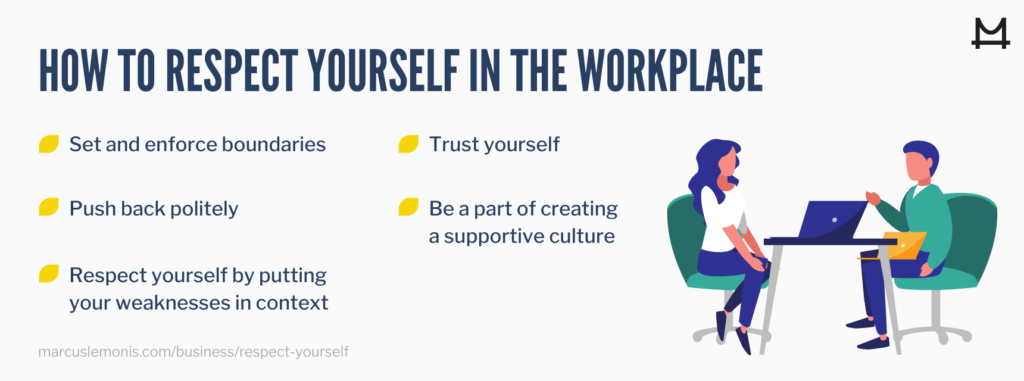
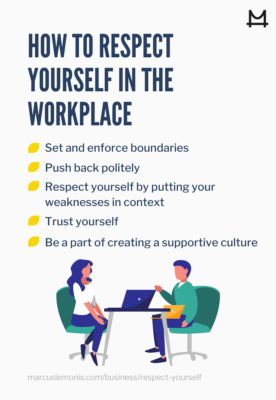
Five Tips for Building Mutual Respect
Remember That Self-Respect Is Not Ego
You definitely want to make sure you’re treated right, but an important distinction is in order. Self-respect isn’t about putting yourself on a pedestal.

It just means that everyone has an equal right to human decency, including yourself. So, just make sure that in your journey you’re not accidentally overcorrecting, putting yourself above anyone else, and making yourself a target.
The Golden Rule Applies
Keep in mind that respect is a two-way street. If you’re not showing respect to others, you lose your footing when it’s time for you to ask for fair treatment. So, treat others the way you want to be treated. When you respect yourself, you live by your own code and hold yourself accountable for treating others fairly.
Advocate For Yourself
Marcus has always been a huge advocate of equal opportunity. It’s a huge reason this learning center exists in the first place. So, make sure to give yourself the opportunities that everyone deserves. Respect yourself enough to know your strengths, put yourself out there, and politely go after what you want. Be bold, set ambitious goals, and go after them.

Be Careful with Uptalking
Take a close look at your intonation after a question. Do you see how your tone goes up at the end? Some people get in the habit of doing this after statements as well. That’s called “uptalking” and is an important habit to work on breaking. If you uptalk after a statement, you sound less sure of yourself and invite pushback. So, when you have something to say, be firm and declarative with your tone.
Body Language
Jordan Peterson, a professor of psychology at The University of Toronto, wrote a great book called 12 Rules for Life.
The book explains the importance of standing up straight with your shoulders back. It’s rooted in evolutionary psychology, but the gist is that positive body language can make you look more formidable, capable, and helps you command respect.
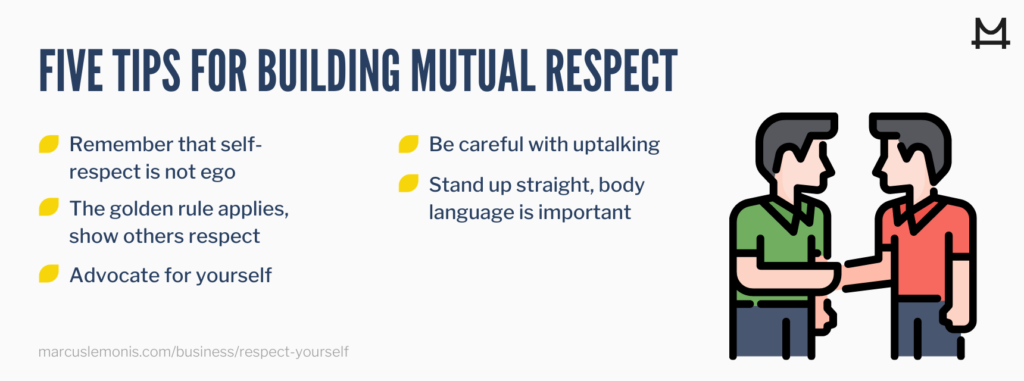
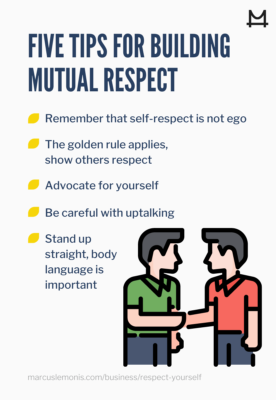
Have you ever left your house, patted yourself down, and taken a quick inventory? You probably rattled off the famous checklist, “Keys, wallet, phone.” Those are all great things to have, but let’s add a fourth one to the list: self-respect. When you respect yourself, you’re happier, get more out of life, and more out of your career. So, be sure to carry that with you wherever your life takes you.
- How do you currently show self-respect?
- Which tips from the above can you leverage to further respect yourself?
Blog.WeekDone.com. (n.d.). Case study: how Deloitte reinvented their performance management.
Retrieved from
https://blog.weekdone.com/case-study-how-deloitte-reinvented-their-performance-management/MayoClinic.org. (2020, July 14). Self-esteem check: too low or just right?
Retrieved from
https://www.mayoclinic.org/healthy-lifestyle/adult-health/in-depth/self-esteem/art-20047976Speights, K. (2017, June 10). 5 lessons on failure from tremendously successful CEOs.
Retrieved from
https://www.fool.com/careers/2017/06/10/5-lessons-on-bouncing-back-from-failure-from-treme.aspx





